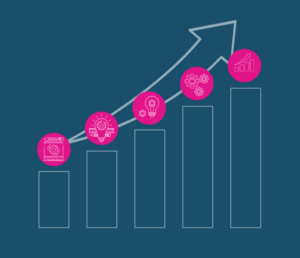
User satisfaction and uptake should not be the primary goal for education technology. The bar for education technology should be that it “works” to effectively support teaching and learning and that there is credible research and evidence to support that claim. The learning science and evaluation experts at SRI International have provided such evidence, and corresponding insights, for decades. But as any Deming-trained process engineer will quickly point out, testing for quality and impacts only at the end of a process risks the high cost of scrap — in this case the “scrap” is wasted developer, teacher, and student time and a missed opportunity for students to achieve their full potential.
To reduce the risk, increase the impact, and lower the development cost of EdTech innovations, we must tap into research-informed insights about how people learn. Learning science experts don’t only do “research” in terms of summative evaluations — they can also help EdTech development at every point along the development life cycle.

Ideation — insights that spark innovation
Learning is complex, and creative design-thinking can generate dozens if not hundreds of approaches to solving challenges in education. A common pitfall is the temptation to focus on the technology alone, and not pay attention to its effects on teaching and learning activities and outcomes. Decades of disappointments have emerged from this approach.
A balanced, interdisciplinary ideation team that includes learning sciences and implementation experts will bring important insights about ways to strengthen tech development and implementation to the table early in the innovation journey — and is essential when the development team shifts from brainstorming to prioritizing where time and funding will be spent.
Early design and prototyping — make critical design decisions early

By leveraging the learning sciences experts at SRI, a design team can iterate with confidence and speed, informed by early and frequent learner feedback. It takes more than simply “failing fast.” Knowing how to measure learning gives the design team the type of learner feedback that matters the most, before project costs escalate. Knowing how to measure success in terms of learning outcomes goes hand-in-hand with any business metric — and sets a course toward innovations that will impact teaching and learning, early in the development life-cycle while the investment level is low.
Minimum viable product (MVP) — know when you have reached v1.0
It often makes sense to soft-launch with an “MVP,” but what makes an edtech innovation minimally viable? Running a pilot of the edtech that collects basic information on ways in which it is used by educators and students and how it helps or hinders learning is a critical step. Without preliminary data, the decisions about additional development and implementation are like a sailboat without a keel and rudder. An experienced learning sciences and implementation team has the tools to chart a credible course towards a successful MVP pilot in the field.
Early production — inform next steps based on emerging evidence
When a new innovation is launched, the evidence that emerges is critical to the early and long-term success of the product. Gathering the preliminary quantitative and qualitative evidence, preferably in real-time, is essential, as it is this beginning stage that leads to eventual widespread acceptance — or not. A learning sciences team can create a plan for field data collection and analysis that is necessary for creating a credible and compelling story.

Evaluate to iterate & scale— collect evidence and lessons to support successful adoption
Education and training customers are increasingly savvy. They can’t afford to invest in hypothetical outcomes, so they rightfully ask, “How do we know this works?” Emerging evidence is helpful, but the full story emerges when a rigorous evaluation is conducted — one that looks at the technology, the users, how it is deployed, AND what impacts it has on teaching and learning. It is good to ask users about their perceptions — but it’s even more important to find out if, in fact, they learned more quickly, deeper, or more successfully… and why.
Learning science is smart EdTech business
Understanding and measuring learning is at the center of what learning science experts do. By partnering with credible learning experts,EdTech developers will save money and time — and accelerate the EdTech innovations our students deserve.
This article was written by Jim Vanides, Senior Education & Industry Consultant & Phil Vahey, SRI Education



